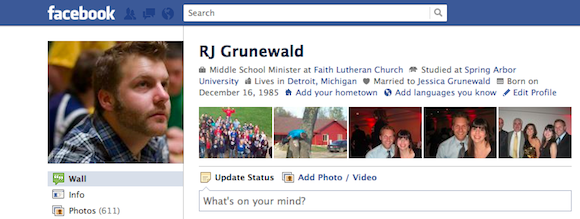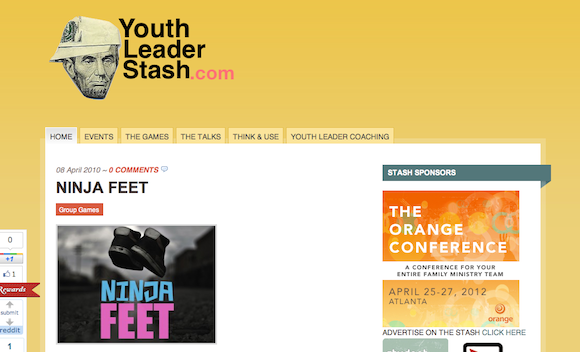[tentblogger-youtube _YQpbzQ6gzs]
[This post is a part of the Creating a Sermon Series series]

How do you decide what to preach? Is it based on a moment of creative inspiration or is there a more methodological way of going about preaching calendar? Whatever way you come up with ideas for what to preach, it is critical that are being intentional with what we are going to say over the next several weeks or months. I believe there are two main categories that our preaching falls into: sermons that people want to hear and sermons that people need to hear. The "want to hear" sermons are the ones that speak to felt needs, topics like friendships, families, stage of life issues. The "need to hear" sermons are the ones that speak to the docrine of a specific belief or even teaching through an entire book of the Bible.
What People Want to Hear
What are the felt needs of the people you are preaching to? Are there things going on in their world that need to be addressed? Are there issues being raised by the culture around them that need to be talked about? It's not likely that people are bringing these ideas to you and asking you to preach on them, but there would be little difficulty in seeing how these topics speak to a practical need in their life. We need to find ways to help people navigate through their immediate felt needs. For example, a common felt need among church-goers might be family relationships. How could we in the midst of a sermon series help people understand the importance of family and how to deal with family relationships bibilically?
What People Need To Hear
We cannot only give people what they want to hear; that can be a very dangerous slope. It may not even be best for the "want to hear" sermons to be a majority, but it should certainly have a presence as you plan. What are the things that are not on the front of a person's mind that they need to hear? What doctrine do they need to be reminded of? As you read through the scriptures, sometimes the Bible speaks to felt needs of the people and other times it takes some education to realize how important something is. When I think about what people need to hear, I tend to try to ask, what doctrines that my students need to be reminded of? What books of the Bible would it be helpful for me to teach through? What might a middle school student need to hear, but not want to hear?
If you only give people what they want to hear, you are in danger on being nothing more than another self-help guru. And if you only give people what they want to hear, what do you do when you get to issues like sin? Most people don't want to hear they are depraved, sinful beings that deserve the wrath of God. But they need to hear that. So the tension becomes balancing what people need to hear and what people want to hear and finding the right way to speak to the totality of what the scriptures speak of.
What are some things people want to hear? What are some things people need to hear?
Photo Credit: Zanthia
 As more and more people have flocked to facebook, it has also become common for more and more people to post things as their statuses that would be better left unposted. For some reason, we feel as though every tidbit of information going on in our head should be shared; especially if we are upset with someone or something. For that reason, I decided to put together a post of some things that I think are better left off of facebook.
As more and more people have flocked to facebook, it has also become common for more and more people to post things as their statuses that would be better left unposted. For some reason, we feel as though every tidbit of information going on in our head should be shared; especially if we are upset with someone or something. For that reason, I decided to put together a post of some things that I think are better left off of facebook.
How Not To Use Facebook
1. As a forum for debate.
Facebook is not the best place to debate your religious or political opinions. I realize that you are passionate about these things, but the truth is that it is much healthier to have an in-person conversation over a digital argument. Internet debates typically go nowhere good very quickly, and for that reason I think it's best for us to not engage in debates online or post things that are for the sake of starting a debate. Post your opinions; disagree with others, but don't let it escalate to becoming a debate.
2. As a place to tell us all your problems.
If you have a problem with someone or a group of people, deal with it in person. Posting it on facebook doesn't solve anything. I regularly see this as a way for people to vent their frustrations when hurt by someone or something. Jesus tells us to deal with our problems with the people directly not by broadcasting it on the internet.
3. A place to complain about your job.
This one is just not smart. What you post online can be used against you in your job or when you are looking for future jobs. Employers often check facebook before they hire new employees, and they often find out about things being posted with current employees. Chances are that if you post on facebook a complaint about your job, your co-workers and possibly your boss will know about it.
4. To replace real relationships
I love to use facebook as a tool to connect with people that I don't always connect with. I also love to use it as another tool for communicating with those I care about. When we get involved in online communities, it can be a temptation to see our digital relationships as no different than our real relationships. You certainly may really, truly care for your digital friends, but don't live in a digital world and forsake the importance of having real live friendships and hanging out with real people.
What are some ways that you think we shouldn't use facebook?
[This post is a part of the Creating a Sermon Series series]

One of the most difficult, yet also most rewarding parts of building a sermon series is getting ideas. Anybody can come up with great ideas for a teaching series; the reason that oftentimes people don't is because it takes a level of discipline and practice to do so. It can be very hard work, but when you work through planning a series and know that the the theme will connect with the students, it is well worth it.
Learn to Steal Well
Great artists steal. Steve jobs said it, picasso said it. Let's be clear, I'm not talking about plagiarism. I think it is terrible for any artist, especially those in the church, to rip off somebody else's idea. What a great artist will do, however, is learn to take ideas from several different sources and use the ideas of others transform it into an entirely new creation. When you watch TV do you see ideas that could become inspiration for a series? When you walk through the grocery store, what do you notice about people and the objects you see, could those inspire an idea? When you listen to other preachers, what ideas start rolling around in your head? Generating ideas for sermon series in large part requires us to be intentional about paying attention to everyday occurances because anything might be worth stealing from.
Write It All Down
We have all had situations where we wake up in the middle of the night with a brilliant idea and are sure that we'll remember it in the morning. Then the morning comes. And the idea is lost forever. It doesn't matter how good your idea is, you need to write it down. You won't remember it in the morning; you might not even remember it an hour later. Even it you have an average idea, write it down because it might later inspire other ideas. Find tools that you can use to write down any unfiltered ideas that you think could be used for something. You may not even know what you will use an idea for; it might clearly not fit as a sermon series idea, but it might be good for something else later.
Give It Time
Anytime I have a great idea, I want to use it right away. I look for ways to bring it into my upcoming teaching even when it seems to be a stretch. It's a natural part of creativity; you get excited about sharing your ideas, but learning to be patient with ideas is critical. As you begin to generate ideas, learn to give your ideas time to grow. Your idea may work good now, but 3 months from now it may be incredible. Give your ideas time to grow as you reflect on it and add to it. Once you write down your idea, let it sit and percolate until the perfect moment when it would make no sense to not use it.
How do you come up with ideas for your sermon series?
 This week we began a new mini-series in our Middle School Ministry called "2 Big Words." Every now and then we come across big words that are difficult to say or understand. In Christianity, there are a couple of words that are not only central to our faith, but because the words are uncommon we might not realize how important these concepts are. In the two weeks of this mini-series we will be talking about justification and sanctification.
This week we began a new mini-series in our Middle School Ministry called "2 Big Words." Every now and then we come across big words that are difficult to say or understand. In Christianity, there are a couple of words that are not only central to our faith, but because the words are uncommon we might not realize how important these concepts are. In the two weeks of this mini-series we will be talking about justification and sanctification.
Let me justify this...
You may not know a lot about justification, but you have probably heard someone say something a long the lines of "let me justify it." Perhaps it is an unusual love for Justin Bieber music and someone has the need to explain their reasoning behind listening to that kind of music. Often it will happen in situations where somebody did something wrong; so someone will try to justify their wrong choice by explaining the reason behind their actions.
To justify something simply means "to make right." When we try to justify our actions, we are trying to make them okay. When we talk about our Christian faith and the idea of justification, we are talking about how our relationship with God is made right.
We all are guilty.
There's not a single one of us who aren't guilty for something. We could go through the commandments one by one and list out the reasons that we are guilty of breaking them. We are sinful and this sin has separated us from God. God is holy and cannot be where sin is, so because of our sin, we have a problem. God cannot be near us.
"For all have sinned and fall short of the glory of God." - Romans 3:23
What can you do to justify your guilt? What can you do to make things right with God? Is there a certain amount of good things you can do to outweigh the bad decisions? Is there any way that you can justify yourself? Fortunately, the answer is no. We can't justify ourselves, but God is not content with letting us be separated from him, so in his great love for us, God makes right our relationship with him.
The unfair trade.
When I was younger, I collected all kinds of trading cards. Occasionally my uncle, who was a garbage man, would deliver boxes filled with trading cards that he found in the trash. My two brothers and I would take the boxes and have to distribute them amongst the three of us; we'd all take turns picking the ones we wanted. Sometimes my youngest brother would end up with a card that I wanted for my collection. Since he was young and didn't know much and I was older and smarter, I contrived a way to get the card I wanted without losing other ones I loved. I traded. Now it was never a fair trade, I somehow would convince him that a rookie card for a rookie card was an even trade. Even if one was a Shaq rookie card and the other was never heard of. I got all the benefits while Corey got none of them.
When we talk about justification, we are also talking about an unfair trade. Nobody gets tricked in this trade, but it is certainly not an even trade. When Jesus goes to the cross, he is making the biggest unfair trade in the history of the world. Jesus trades his righteousness for our sin. We receive all the benefits; we get a right relationship with God. And Jesus becomes sin. Our relationship with God is made right because Jesus justifies and by faith we receive this gift.
Photo Credit: Calaggie
I have just recently started using the website Youth Leader Stash. If you are looking for a place with tons of games to use in your youth ministry, this blog, which was created by Chad and Cat Swanzy, is a great resource. This morning in our youth group, we just utilized the game called Ninja Feet.

I never knew that there would be a day when I thought to myself, I need to buy a thermostat. I had assumed that the next time I would buy a thermostat would be when something caused my current thermostat to fail. And at that point, I would drive to the local hardware store and look for something cheap to solve my problem. I like my house to be the proper temperature, but I don't get excited about temperature control devices. That was until the Nest Learning Thermostat. This week former Apple engineers, who helped create the iPod, unveiled their latest technological creation. Tony Fadell and Matt Rogers announced a thermostat called "Nest" that magically learn your habits.
[tentblogger-youtube QCJ1PnVlzIE]
Why I Decided I Needed a New Thermostat
It's stunning.
The design is incredible. Watch the video and watch how simple and elegant the design is. The user experience appears to be done flawlessly and will be much simpler than any other thermostat that exists. I love good design and this was the first time I ever thought that design even mattered in controlling the temperature of my house.
It's smart.
According to Nest, the thermostat will begin to start to learn your routine after a week of use. It begins to understand what temperature you like in the morning and what temperature you like when you go to bed. As you adjust the temperature, it begins to learn what temperatures it should automatically adjust to in order to suit your needs. It also is built with a motion detector, so when it realizes that no one is home, it is smart enough to switch into an away mode. It also has WiFi built in, so in the situations that I want to control the temperature form my iPhone, I can.
It's made by people who made the iPod.
When I explained to my wife the reason we need this thermostat and I made this point, she quickly said, "So that's the real reason you want it." Apple designs great products, so why would I expect anything different from a couple of ex-apple engineers that decided to get into the thermostat business.
[This post is a part of the Creating a Sermon Series series]

In churches all over the world, it is common for the preaching to be organized in groups of sermons called a sermon series. Youth pastors, senior pastors, and children pastors often will look for common threads to organize how they teach the scriptures in a memorable way. As I've worked through putting together several sermon series for weekly programs and retreats, I have found using a sermon series to very helpful for both myself and those listening to me.
It Helps People Remember
Branding matters.
If you look around any department store, spend a couple minutes watching television, or do a couple searches on Google - you will without a doubt be bombarded with brands trying to find ways to make sure you remember their brands and products. The reason they do this is because they learned that creating a recognizable brand is effective.
I'm not suggesting we start advertising in all these different ways, but as we are preaching the Word of God, we are trying to communicate the message in way that people will remember. As you create a sermon series, not only are you opening up the Word of God, but you are wrapping the life-changing content in a context that will hopefully make the message memorable as people listen.
It Let's People Know Where You're Going
When you use a series, people probably aren't coming to church simply because they are excited about the sermon series. It may happen, but it's not likely. Even if people aren't coming because of the sermon series you are teaching, there is an element of comfort for people to know that you have an idea of where the next few weeks are going. If you want to be effective in your teaching, it is important that people can trust you. If they have an idea that you know where you're going, they are going to be much more likely to trust you taking them there.
It Builds Momentum Around a Given Topic
If you could spend 1 day or 7 days on vacation with your family, which would have a greater impact on you and your family? In the same way, spending 1 week or 5 weeks, significantly changes the amount of impact that you might have as you talk about a specific topic or book of the Bible. As you spend multiple weeks going to the same book and working through it, momentum begins to build as people hear the words, think about them, live with them, and come back without having to shift their way of thinking.
It Helps Creativity
Whenever I work on a sermon series, on of the things that I have noticed about myself is that creating a theme that I am trying to preach from within helps me creatively. Some might argue that putting yourself in a box, restricts creativity, but I would argue that the clear focus and concepts allows more room for creativity. Having clear goals and definitions allows you to let some ideas sit in your brain and percolate.
What are some reason that you see that using a sermon series can be helpful?
 Preaching is an important part of youth ministry. We spend large portions of our time creating, writing, and giving sermons to our students because we believe that God's word is powerful. As you work with students, you likely not only want to preach God's word, but you want to do so clearly and creatively. You want students to be engaged with the scriptures, not bored by something that they think doesn't relate to their life.
Preaching is an important part of youth ministry. We spend large portions of our time creating, writing, and giving sermons to our students because we believe that God's word is powerful. As you work with students, you likely not only want to preach God's word, but you want to do so clearly and creatively. You want students to be engaged with the scriptures, not bored by something that they think doesn't relate to their life.
One of the most valuable ways, in my opinion, to preach through the Bible is by organizing it in a sermon series. This isn't something mandated by the Bible, so it is by no means the only way to organize your teaching calendar. A sermon series is in essence a way to organize a group of messages that are tied together by some common thread and preach through those in succession and with a similar branding so that the messages are more memorable for the hearers.
The Creating a Sermon Series series is meant to help anyone who preaches. It will discuss topics ranging from the value of using a sermon series in preaching to the practical elements of actually figuring out how to brand your series and package it together in a creative way.
This post will serve as the general Table of Contents for this series and be the place to reference all of the posts that are a part of this series.
Upcoming Posts
1. Preaching Using a Sermon Series
6. Sermon Series Branding Questions
7. Writing Messages as a Part of a Series
8. And more...
If you have any ideas for topics that you would like to see discussed as a part of this series, let me know in the comments.
Photo Credit: Lars Hammar
You are a theologian.
You may not think of yourself as one, but the truth is you are one. Theology is the study of God; since you are bound to have some opinions, beliefs, or practices related to who God is and what he has done, you are a theologian. Good theology can give a person peace in a time of tragedy, hope when things seem hopeless, and grace when a person should feel guilt. On the other hand, poor theology is toxic for the soul, leading individuals down paths that are dangerous both spiritually and also practically.
In our ministries it is important that we continually evaluate our theology. What does the scripture say about what we are teaching? What does God's word reveal to us about the things that we say are important? How does our orthodoxy influence our daily practices? The danger is that it is easy to fall into the trap of spending more time concerned with what is relevant at the expensive of worrying about what is true. Relevance is critical, especially in youth ministry, but the truth is always relevant.
Theology matters. Concern yourself with handling God's word properly. Try to find the most effective way to teach your students God's word, but don't let the context take priority over the content of the message.
"Let your wife worry about your clothes. Buy books and study. We don't need any more well-dressed, hip, funny, heretics. Who cares how you say it if what you're saying is wrong." - Matt Chandler, Pastor at The Village Church
Photo Credit: Nick Treby
 [This post is a part of the Youth Ministry 101 series]
[This post is a part of the Youth Ministry 101 series]
If you are a part of youth ministry, you are also likely in some way involved with leading some type of small group discussion. The conversations that take place in youth ministry are a critical element of any youth ministry. Small group discussions may be built in as a small or large part of a weekly program; they may be something entirely separate from any program. Allowing our students to participate in discussing and discovering the truth of scripture as we lead them through a bible study can be both a difficult process and a rewarding one.
5 Tips for Leading a Small Group
1. Be okay with silence.
This is difficult. Most leaders want to fill in the spaces and start talking; but silence is not a bad thing. Wait. Allow them to think and process the question. Don't feel the need to move onto something else too quickly if there isn't an answer right away. Perhaps the question just needs to be asked in a different way.
2. Ask the right questions.
The best small group leaders are not the ones that have a lot of information to share, but the ones who know how to ask the right questions. A good question can set into motion a great conversation. If you are given questions to work through, look for opportunities to ask follow up questions to really dig into the heart of the answer.
3. Have fun.
This is youth ministry; if your small group is boring, they are not going to want to come.
4. Contact students outside of church.
Youth ministry is all about relationships. One of the best ways to build relationships with students is to be in touch with them outside of weekly youth ministry programs. Call them to follow up with something you talked about previously. Post something on their facebook wall. Attend one of their sporting events. These things mean a lot to a student in your small group.
5. It's all about Jesus.
This probably shouldn't be last, but I didn't put them in any particular order. Everything you do in your small group is ultimately about students growing in their relationship with Jesus. That doesn't mean that everything you do needs to be an in-depth discussion about Him, but it does mean that as a leader you should recognize that the fun you have, even if it doesn't relate to anything, is done for the sake of Jesus. It's all about Jesus; even the stuff that doesn't seem like it is.
Photo Credit: stlyouth
“Creativity is just connecting things. When you ask creative people how they did something, they feel a little guilty because they didn’t really do it, they just saw something. It seemed obvious to them after a while. That’s because they were able to connect experiences they’ve had and synthesize new things.” - Steve Jobs in 1995 interview (HT: Austin Kleon)
 Being around a group of other middle school ministry pastors for a weekend inspired me to make a list of random generealizations about what is true of many of us who find ourselves working with middle school students. All of these things came from observations that I had about middle pastors while at the campference; they are all at least true of myself.
Being around a group of other middle school ministry pastors for a weekend inspired me to make a list of random generealizations about what is true of many of us who find ourselves working with middle school students. All of these things came from observations that I had about middle pastors while at the campference; they are all at least true of myself.
You Might Be a Middle School Pastor If...
- You own a pair (or two) of a converse.
- You cannot walk through wal-mart without thinking of game ideas.
- You think poop is funny.
- You have a nerf gun in your office.
- You think any object can become a game.
- You think you're awesome at dodgeball because you normally dominate middle schoolers.
- You love to meet other people who love middle school students.
- Your crazy enough to believe junior high students can change the world.
What should I add to the list?
Photo Credit: Varjakkk
 If you work with middle school students, it's always helpful to think back to what life was like when you were in middle school. I spent some time thinking about it, and here is the list that I came up with:
If you work with middle school students, it's always helpful to think back to what life was like when you were in middle school. I spent some time thinking about it, and here is the list that I came up with:
- I wanted to be in the NBA.
- I bought an mp3 player for $300 that held 8 songs.
- People freaked out about Y2K.
- Gas cost a little over $1/gallon.
- I started using AOL Instant Messenger and created my first ever SN: rjgrune2000 still works to this day.
- I didn't own a cell phone.
- My computer ran Windows 98.
- My grandma had this crazy computer called an iMac.
- People in schools started worrying about school shooting.
- Pirating music became popular due to a program called napster.
- Beanie Babies and Tamagotchi were popular for a short time.
- I made a website dedicated to Britney Spears.
- A teacher told me I'd make a good pastor someday; I thought she was crazy.

